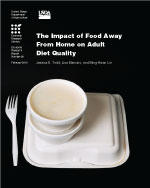The Impact of Food Away From Home on Adult Diet Quality
- by Jessica E. Todd, Lisa Mancino and Biing-Hwan Lin
- 2/16/2010
Overview
Food away from home (FAFH) has been associated with poor diet quality in many studies. It is difficult, however, to measure the effect of FAFH on diet quality since many unobserved factors, such as food preferences and time constraints, influence not just our choice of where to eat but also the nutritional quality of what we eat. Using data from 1994-96 and 2003-04, this study applies fixed-effects estimation to control for such unobservable influences and finds that, for the average adult, FAFH increases daily caloric intake and reduces diet quality. The effects vary depending on which meals are consumed away from home. On average, breakfast away from home decreases the number of servings of whole grains and dairy consumed per 1,000 calories and increases the percent of calories from saturated and solid fat, alcohol, and added sugar (SoFAAS) in a day. Dinner away from home reduces the number of servings of vegetables consumed per 1,000 calories for the average adult. Breakfast and lunch away from home increase calories from saturated fat and SoFAAS on average more among dieters than among nondieters. Some of the overall negative dietary effects decreased between 1994-96 and 2003-04, including those on whole grain, sodium, and vegetable consumption.
Download
-
Entire report
Download PDF -
Report summary
Download PDF
We’d welcome your feedback!
Would you be willing to answer a few quick questions about your experience?

